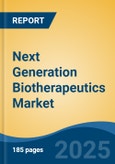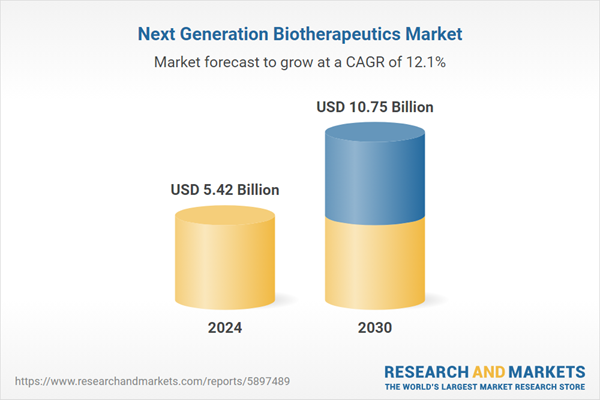Speak directly to the analyst to clarify any post sales queries you may have.
10% Free customizationThis report comes with 10% free customization, enabling you to add data that meets your specific business needs.
Their application spans a wide range of conditions, offering new hope for patients unresponsive to conventional therapies. As the demand for tailored, data-driven healthcare solutions grows, NGBTs are rapidly gaining traction across global healthcare systems. By activating the body’s natural mechanisms and harnessing next-gen molecular strategies, these biotherapeutics are reshaping medical treatment paradigms. With continuous R&D breakthroughs, NGBTs are advancing the possibilities of treating complex and previously untreatable diseases, offering better clinical outcomes and redefining standards in patient care.
Key Market Drivers
Increasing Incidence of Cancer
The escalating global cancer burden is a major factor propelling the demand for Next Generation Biotherapeutics. Cancer rates are expected to rise by 77% by 2050 compared to 2022, highlighting an urgent need for more precise, effective treatment strategies. Traditional treatments like chemotherapy and radiation are often associated with systemic toxicity and limited efficacy. In contrast, NGBT harnesses advanced genomic profiling to tailor therapies to an individual's unique genetic profile, targeting cancer at its molecular root. These therapies are designed to overcome resistance mechanisms and minimize damage to healthy tissues, enhancing therapeutic precision and patient quality of life. As the need for more adaptable and less invasive therapies intensifies, NGBTs are positioned as a vital component in the evolving landscape of oncology treatment.Key Market Trends
Increasing Aging Population
The global demographic shift toward an older population is a major trend fueling demand for NGBTs. By 2050, the population aged 65 and above is expected to grow to 16%, further increasing to 24% by 2100. With age comes a heightened prevalence of chronic and degenerative diseases such as cancer, cardiovascular disorders, and neurodegenerative conditions.NGBTs provide targeted, innovative therapies tailored to the complex health needs of aging individuals. These biotherapeutics offer a high level of personalization, which is especially critical for elderly patients managing multiple comorbidities. Their potential to reduce hospitalizations and long-term care needs also makes them attractive for healthcare systems aiming to improve outcomes while controlling costs. As aging continues to drive global healthcare demand, NGBTs stand out as a promising solution for personalized, effective disease management in elderly populations.
Key Market Players
- Xencor, Inc.
- Regenxbio & Neurimmune AG
- Takeda Pharmaceutical Company Limited
- Pfizer, Inc.
- AstraZeneca Plc.
- F. Hoffmann-La Roche Ltd.
- Kyowa Kirin Co., Ltd
- Seattle Genetics, Inc
- ImmunoGen, Inc
- Ono Pharmaceuticals Co, Ltd
Report Scope:
In this report, the Global Next Generation Biotherapeutics Market has been segmented into the following categories, in addition to the industry trends which have also been detailed below:Next Generation Biotherapeutics Market, By Therapeutic Area:
- Oncology
- Autoimmune/ Inflammatory Diseases
Next Generation Biotherapeutics Market, By Technology:
- Antibody-Drug Conjugates
- Bispecific Antibodies
- Antibody Fragments
- Antibody-like Proteins
- Others
Next Generation Biotherapeutics Market, By Region:
- North America
- United States
- Canada
- Mexico
- Europe
- France
- United Kingdom
- Italy
- Germany
- Spain
- Asia-Pacific
- China
- India
- Japan
- Australia
- South Korea
- South America
- Brazil
- Argentina
- Colombia
- Middle East & Africa
- South Africa
- Saudi Arabia
- UAE
Competitive Landscape
Company Profiles: Detailed analysis of the major companies present in the Global Next Generation Biotherapeutics Market.Available Customizations:
With the given market data, the publisher offers customizations according to a company's specific needs. The following customization options are available for the report.Company Information
- Detailed analysis and profiling of additional market players (up to five).
This product will be delivered within 1-3 business days.
Table of Contents
Companies Mentioned
- Xencor, Inc.
- Regenxbio & Neurimmune AG
- Takeda Pharmaceutical Company Limited
- Pfizer, Inc.
- AstraZeneca Plc.
- F. Hoffmann-La Roche Ltd.
- Kyowa Kirin Co., Ltd
- Seattle Genetics, Inc
- ImmunoGen, Inc
- Ono Pharmaceuticals Co, Ltd
Table Information
| Report Attribute | Details |
|---|---|
| No. of Pages | 185 |
| Published | May 2025 |
| Forecast Period | 2024 - 2030 |
| Estimated Market Value ( USD | $ 5.42 Billion |
| Forecasted Market Value ( USD | $ 10.75 Billion |
| Compound Annual Growth Rate | 12.0% |
| Regions Covered | Global |
| No. of Companies Mentioned | 10 |









